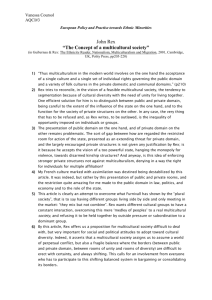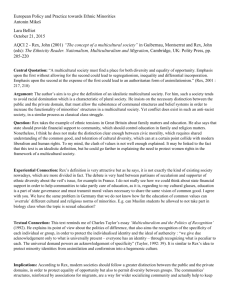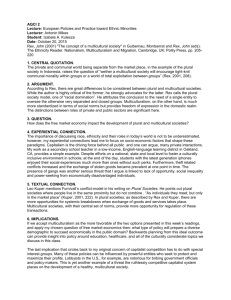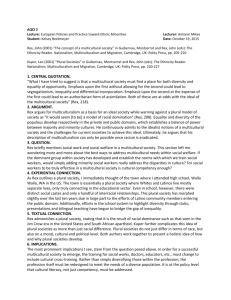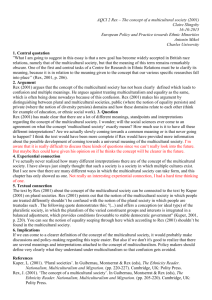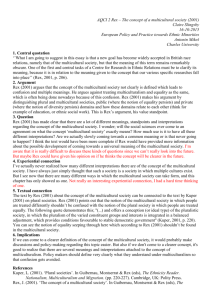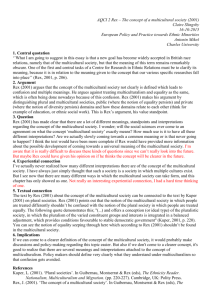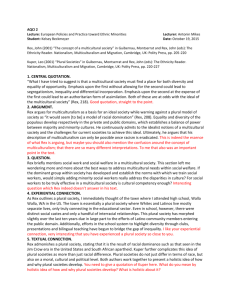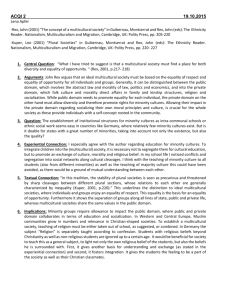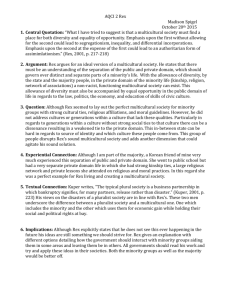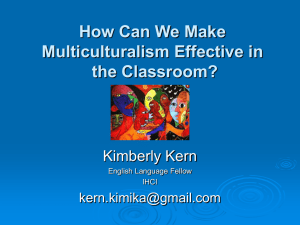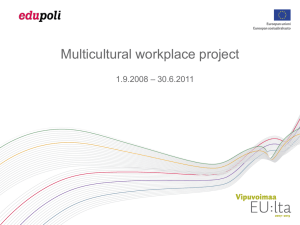AQCI 2 Rex – The concept of a multicultural society (2001) Claire
advertisement
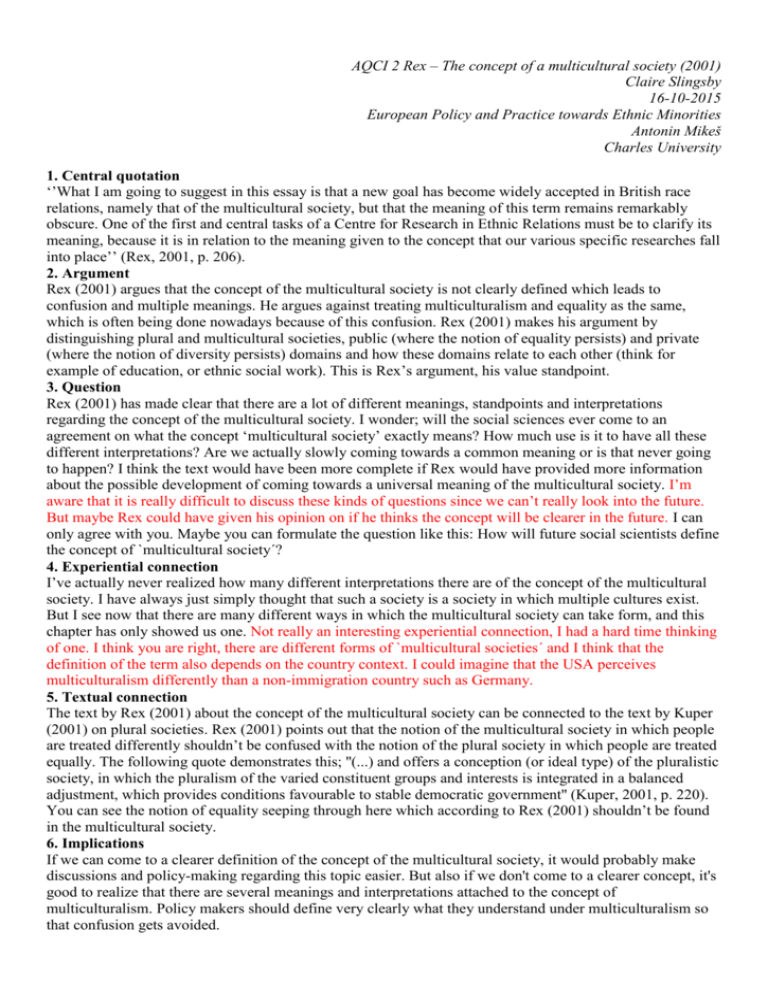
AQCI 2 Rex – The concept of a multicultural society (2001) Claire Slingsby 16-10-2015 European Policy and Practice towards Ethnic Minorities Antonin Mikeš Charles University 1. Central quotation ‘’What I am going to suggest in this essay is that a new goal has become widely accepted in British race relations, namely that of the multicultural society, but that the meaning of this term remains remarkably obscure. One of the first and central tasks of a Centre for Research in Ethnic Relations must be to clarify its meaning, because it is in relation to the meaning given to the concept that our various specific researches fall into place’’ (Rex, 2001, p. 206). 2. Argument Rex (2001) argues that the concept of the multicultural society is not clearly defined which leads to confusion and multiple meanings. He argues against treating multiculturalism and equality as the same, which is often being done nowadays because of this confusion. Rex (2001) makes his argument by distinguishing plural and multicultural societies, public (where the notion of equality persists) and private (where the notion of diversity persists) domains and how these domains relate to each other (think for example of education, or ethnic social work). This is Rex’s argument, his value standpoint. 3. Question Rex (2001) has made clear that there are a lot of different meanings, standpoints and interpretations regarding the concept of the multicultural society. I wonder; will the social sciences ever come to an agreement on what the concept ‘multicultural society’ exactly means? How much use is it to have all these different interpretations? Are we actually slowly coming towards a common meaning or is that never going to happen? I think the text would have been more complete if Rex would have provided more information about the possible development of coming towards a universal meaning of the multicultural society. I’m aware that it is really difficult to discuss these kinds of questions since we can’t really look into the future. But maybe Rex could have given his opinion on if he thinks the concept will be clearer in the future. I can only agree with you. Maybe you can formulate the question like this: How will future social scientists define the concept of `multicultural society´? 4. Experiential connection I’ve actually never realized how many different interpretations there are of the concept of the multicultural society. I have always just simply thought that such a society is a society in which multiple cultures exist. But I see now that there are many different ways in which the multicultural society can take form, and this chapter has only showed us one. Not really an interesting experiential connection, I had a hard time thinking of one. I think you are right, there are different forms of `multicultural societies´ and I think that the definition of the term also depends on the country context. I could imagine that the USA perceives multiculturalism differently than a non-immigration country such as Germany. 5. Textual connection The text by Rex (2001) about the concept of the multicultural society can be connected to the text by Kuper (2001) on plural societies. Rex (2001) points out that the notion of the multicultural society in which people are treated differently shouldn’t be confused with the notion of the plural society in which people are treated equally. The following quote demonstrates this; ''(...) and offers a conception (or ideal type) of the pluralistic society, in which the pluralism of the varied constituent groups and interests is integrated in a balanced adjustment, which provides conditions favourable to stable democratic government'' (Kuper, 2001, p. 220). You can see the notion of equality seeping through here which according to Rex (2001) shouldn’t be found in the multicultural society. 6. Implications If we can come to a clearer definition of the concept of the multicultural society, it would probably make discussions and policy-making regarding this topic easier. But also if we don't come to a clearer concept, it's good to realize that there are several meanings and interpretations attached to the concept of multiculturalism. Policy makers should define very clearly what they understand under multiculturalism so that confusion gets avoided. References Kuper, L. (2001). ‘Plural societies’. In Guibernau, Montserrat & Rex (eds), The Ethnicity Reader. Nationalism, Multiculturalism and Migration. (pp. 220-227). Cambridge, UK: Polity Press. Rex, J. (2001). ‘The concept of a multicultural society’. In Guibernau, Montserrat & Rex (eds), The Ethnicity Reader. Nationalism, Multiculturalism and Migration. (pp. 205-220). Cambridge, UK: Polity Press. AQCI ASSESSMENT FORM Student’s name: Claire Slingsby Essay title: AQCI 2 Rex – The concept of a multicultural society (2001) Name of assessor: Excel lent 1) Is the chosen quotation central to the author’s argument? Go od Date: Aver age Po or xx x x After reading the paragraph I am fully able to understand Rex argument and implications x x x x xx xx Essay grade: Further comments: x xx x I think the experiential connection is never that easy but maybe try to think of some examples of how `multicultural society´ is conceptualized in different countries Both in-text references and bibliography are present 6) Have the implications been well understood, can they have a practical impact for policy making? 7) Expression/Presentation a) Are the style, grammar and general use of English adequate? b) Is the AQCI professionally presented? I like the train of thought, it only needs to be put into one, concise question From what I understood it wasn´t full answered in the text x xx 5c) Has it been adequately explained how the present text's argument contrasts with, contradicts, confirms, clarifies, or elaborates the other text's argument or point? x x 4) Is the experiential connection relevant/interesting? 5a) Is the textual connection relevant/interesting? 5b) Has it been cited properly? Comments I think it is Rex´ central argument 2) Has the main argument been fully understood (including its ‘for’ and ‘against’ sides, if applicable)? 3a) Is the question raised important/relevant/interesting? 3b) Has this question not been fully answered in the text? Not accept able 16-10-2015 x
